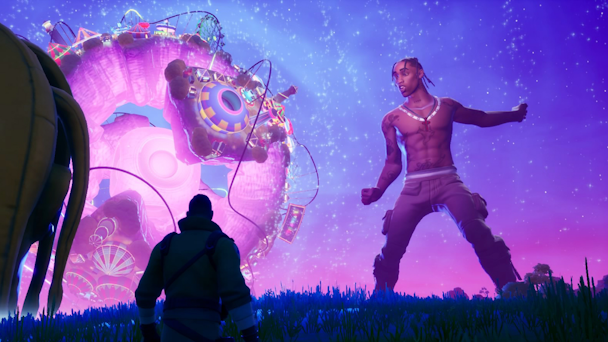Why the scramble to own the metaverse is a wake-up call for the ad industry
Wayne Deakin, executive creative director, EMEA, Huge, is all too aware how often the word ‘metaverse’ is being used by those in the know. He thinks advertisers should be careful before calling it a fad.

Fortnite, the game that helped put the metaverse on the map
You might think the news that online gaming platform Roblox has acquired the chat platform Guilded is a niche tech story, which doesn’t impact on your life either managing brands or creating campaigns to help them grow.
But I think the reason behind the deal is really interesting. Guilded is the platform that allows users to chat to other community members, something which the majority of Roblox users do. And now Roblox owns the means of communication in its metaverse, meaning the end-to-end experience is closer to becoming unified.
Even more interesting is looking at this strategy in the context of the trend for other companies – most notably Facebook beta testing its VR office platform Horizon Workrooms – shifting focus away from being about social and on to the business of the metaverse. There’s clearly a lot more going on here than tech investments.
I think there’s a strong argument to see it as a warning shot for brands beyond the digital space to wake up and start fighting for more ownership themselves.
Setting aside the notion of metaverse for a minute, the guiding principle is that it makes sense for a brand to own the end-to-end experience. And this is something that anyone in the product industry can relate to as much as those in the digital space, as is reflected in the rise of direct-to-consumer (DTC) thinking among brands.
While DTC selling isn’t new, its revival in the 2010s was driven by challenger brands who needed to make small marketing budgets work very hard, meaning they focused on reaching consumers comfortable with making even big-ticket purchases without seeing the products in person first.
Of course, established brands quickly realized how many advantages there are to owning if not the entire end-to-end sales process, then at least a whole lot more of it than when middlemen retailers ruled consumer spending. Now sectors from FMCG to publishing to automotive are adopting DTC – but then questioning exactly how much of the end-to-end experience they should own.
The argument has always been that the best strategy is to do the thing you’re an expert at and to outsource the rest. Of course, that means relinquishing control of the experience to a third party and all the issues that come with any supplier relationship.
The idea that it’s an either/or situation, however, is false. Acquiring and integrating parts of the end-to-end experience you don’t own is an option of course, as with Roblox and Guilded. And then there’s the strategy of building your own tech and infrastructure. That’s something I’ve experienced firsthand numerous times. Starbucks is one example, working on its virtual proposition as part of a mass investment in digital innovation.
The result was something that disrupted the market in the short term, but more importantly now accounts for a significant proportion of sales. And, if we go back to the issue of the metaverse, it created a customer experience that transcends the space between the virtual and real world.
I’ve also seen it when Warner Bros and the Blair Partnership commissioned Huge to create a DTC Harry Potter experience, which resulted in Wizarding World. The app is packed with interactive features and content to trigger fans’ involvement and give the brand ownership of the direct relationship with them.
In the digital space, from search to gaming, the value of owning the end-to-end experience has been understood for a while. Now it’s time for those in the product space to get the tools to make it happen too, and for creative agencies to facilitate this. To me, it’s not such a huge leap in thinking – it’s more a case of a product mentality and a brand mentality coming together.
Obviously, I’m just some creative working in an agency and you’re forgiven if you take my perspective with a grain of salt. So I’ll finish off by making one last point, which is that at all the nerdy developer conferences I’ve attended over the past couple of years it’s impossible not to notice that they’re always full of people from VC funds and the private equity industry. They’re there because they recognize the financial value that is coming from this trend – surely that makes it worth your consideration, at the very least.
